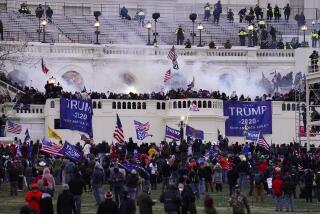Chile’s Death Toll in Protests Rises to Six; 577 Arrested
- Share via
SANTIAGO, Chile — As scattered new incidents of violence were reported Thursday, Chile counted six dead and nearly 600 arrested in widespread protests against President Augusto Pinochet.
In the Los Copihues neighborhood of the capital, police fired into the air to disperse a mob of about 200 slum dwellers who tried to sack a supermarket Thursday afternoon. Officers used tear gas against demonstrators who built barricades at Santa Julia in the same poor eastern section.
577 Arrested
The fresh unrest belied the everyday routine that returned to major Chilean cities Thursday after a day of street demonstrations that ranged from Arica in the north to Punta Arenas in the extreme south, a distance of 2,000 miles.
By official count, Wednesday’s protest left six dead and 63 civilians and 18 policemen injured. Police reported 577 arrests, 348 of them in the capital, and said mobs looted 22 supermarkets, bakeries and other shops, all but one of them in Santiago.
Wednesday’s protests were principally orchestrated by the outlawed Chilean Communist Party, which espouses violence and calls for the immediate overthrow of Pinochet, who has ruled Chile as a strongman since 1973. Democratic parties opposed the street demonstrations but added to Wednesday’s disruptions by asking their supporters to go home early.
An alliance of democratic parties is calling for a negotiated end to Pinochet’s tenure, which lasts at least until 1989. Opponents charge that Pinochet, who rules by decree with military backing, intends to prolong his term until 1997 under the provisions of a disputed constitution approved in 1980.
‘Drastic Measures’ Threatened
More than 100 civilians have died since his opponents first took to the streets against Pinochet in 1983. Wednesday’s protest, the first major show of opposition force since Pinochet lifted a state of siege in June, was as disruptive as any in the last two years. Pinochet has threatened unspecified “drastic measures” to combat violence.
There was some speculation, however, that the absence of massive troop deployments and the decision not to impose an early curfew Wednesday night might reflect the influence of those within the government seeking a more moderate stance.
Chilean observers agreed with a government assertion Thursday that the death toll would have been worse except that the police and the troops supporting them avoided direct confrontation where possible.
Police Guns Silent
“This institution did not use firearms in any sector to break up disorders, clear roads, or repress attacks on private or public property,” Chile’s Carabineros, the militarized national police force, said in a communique Thursday.
All six of Wednesday’s demonstration victims--five men and one woman--died in Santiago. Two were shot in separate incidents by private security guards defending shops under mob assault. Of the others, two were shot at or near demonstrations, and a third died from shots apparently fired from within a community center under attack by demonstrators. The fourth, a 26-year-old ceramics worker who casually left his home to buy cigarettes Wednesday night, was murdered by a man who leaped from a passing car and shot him without speaking, witnesses said Thursday.
Chile’s 35,000-member national police force, one of the four pillars of the military government, is seeking to repair its public image after a scandal in which a federal judge implicated 14 policemen in the murder of three Communist Party members last March.
On Thursday, a military court refused to accept jurisdiction to hear charges against seven of the 14 in a kidnaping case related to the murders. The case was thus returned to federal Judge Jose Canovas, who made the allegations. Canovas may now assume jurisdiction himself or ask the Chilean Supreme Court to assign it.
More to Read
Sign up for Essential California
The most important California stories and recommendations in your inbox every morning.
You may occasionally receive promotional content from the Los Angeles Times.










